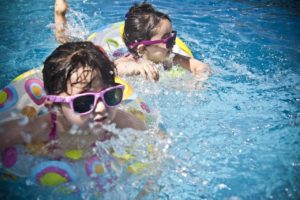 Water is one of the most ominous hazards your child will encounter. Young children can drown in only a few inches of water, even if they’ve had swimming instruction. Vacation time is a great opportunity to develop family memories and enjoy time with your kids. If pools and oceans are in your plans, this is a good article to read. However; bathtubs, toilets, buckets, and standing water can also be a hazard. Drowning is the number one cause of death for children under five. Babies and toddlers are top-heavy, which makes them susceptible to drowning. If a baby falls into even shallow water, she can’t always lift herself out. Drowning can occur quickly and quietly, without any warning noises. And death sometimes isn’t the only bad outcome. Many survivors suffer severe and permanent brain injuries because of the time they spend without adequate oxygen to their brains. Fortunately, the vast majority of drownings are preventable. Here are some tips to help keep your kids safe this summer:
Water is one of the most ominous hazards your child will encounter. Young children can drown in only a few inches of water, even if they’ve had swimming instruction. Vacation time is a great opportunity to develop family memories and enjoy time with your kids. If pools and oceans are in your plans, this is a good article to read. However; bathtubs, toilets, buckets, and standing water can also be a hazard. Drowning is the number one cause of death for children under five. Babies and toddlers are top-heavy, which makes them susceptible to drowning. If a baby falls into even shallow water, she can’t always lift herself out. Drowning can occur quickly and quietly, without any warning noises. And death sometimes isn’t the only bad outcome. Many survivors suffer severe and permanent brain injuries because of the time they spend without adequate oxygen to their brains. Fortunately, the vast majority of drownings are preventable. Here are some tips to help keep your kids safe this summer:
- Never leave a child unsupervised near a pool, spa, bathtub, toilet, water-filled bucket, pond or any standing body of water for even a second!
- Always have a designated watcher for young children around water. Make sure the designated person is not involved in distracting activities, such as talking on the phone, playing games, etc.
- By law, all pools and spas must be fenced. Install a four-sided, 5-foot fence gate that is self-closing and self-latching (latches should be above a child’s reach). The fence should surround any pool or spa with openings no more than 4 inches wide to prevent children from squeezing through the spaces. The fence should completely separate the pool from the house.
- Many flotation devices are considered toys and are not designed to keep swimmers safe. Do not use flotation toys that are air-filled or foam toys, such as noodles or inner tubes in place of life jackets.
- Do not allow children to play in and around the pool or spa area. Remove all toys, balls, and floats from around or in a pool if supervision is not available.
- Avoid swimming after dark and in muddy waters of lakes, ponds, and rivers.
- New evidence shows that children ages 1 to 4 may be less likely to drown if they have had formal swimming instruction. The studies are small, and they don’t define what type of lessons work best, so the American Academy of Pediatrics is not recommending mandatory swim lessons for all children ages 1 to 4, at this time. Instead, the new guidance recommends that parents should decide whether to enroll an individual child in swim lessons based on the child’s frequency of exposure to water, emotional development, and physical ability.
- Regardless of one’s swimming ability, size of the boat or distance to be traveled, require all persons to wear U.S. Coast Guard approved lifejackets/personal flotation devices when boating or participating in other water-related recreational activities.
- Avoid alcohol consumption or use of other drugs while supervising children during recreational water activities or participating in recreational water activities.
-
Check the local weather conditions prior to engaging in recreational water activities.
-
Learn CPR! It saves lives.
-
If you have a home pool, keep a safety ring with a rope beside the pool, at all times. If possible, have a phone in the pool area with emergency numbers clearly marked.
- Remove any containers with water in them from around the house and make sure your child can’t get to any bodies of water, including the bath, on his own.
There are probably lots more safety tips that could be shared. But hopefully, this post has helped to emphasize that water safety is critical–you never know when it might really matter.
Contact Us (859-525-8181) if you have any questions!
—
 About Pediatrics of Florence
About Pediatrics of Florence
We believe that children are more than just “little adults.” They have unique personalities, challenges, and life circumstances and we have made every effort to make our offices and care as “kid friendly” as possible. We have an aquatic theme in the waiting rooms (separated for sick and well children) as well as themed examination rooms. All of our physicians are Board Certified Pediatricians and members of the American Academy of Pediatrics and our nurse practitioners are all licensed Pediatric Nurse Practitioners and are available to see both well and sick children.
>> Learn More About Pediatrics of Florence
